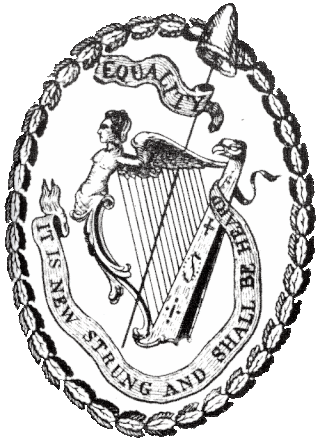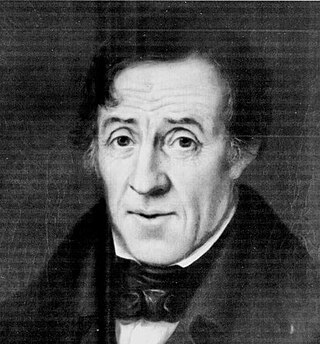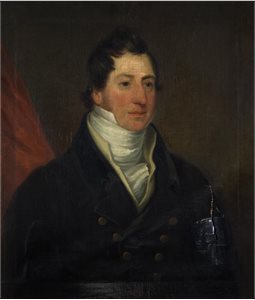Related Research Articles

The London Corresponding Society (LCS) was a federation of local reading and debating clubs that in the decade following the French Revolution agitated for the democratic reform of the British Parliament. In contrast to other reform associations of the period, it drew largely upon working men and was itself organised on a formal democratic basis.

Theobald Wolfe Tone, posthumously known as Wolfe Tone was a revolutionary exponent of Irish independence and is an iconic figure in Irish republicanism. Convinced that, so long as his fellow Protestants feared to make common cause with the Catholic majority, the British Crown would continue to govern Ireland in the interest of England and of its client aristocracy, in 1791 he helped form the Society of United Irishmen. Although received in the company of a Catholic delegation by the King and his ministers in London, Tone, with other United Irish leaders, despaired of constitutional reform. Fuelled by the popular grievances of rents, tithes and taxes, and driven by martial-law repression, the society developed as an insurrectionary movement. When, in the early summer of 1798, it broke into open rebellion, Tone was in exile soliciting assistance from the French Republic. In October 1798, on his second attempt to land in Ireland with French troops and supplies, he was taken prisoner. Sentenced to be hanged, he died from a reportedly self-inflicted wound.

Loyalism, in the United Kingdom, its overseas territories and its former colonies, refers to the allegiance to the British crown or the United Kingdom. In North America, the most common usage of the term refers to loyalty to the British Crown, notably with the loyalists opponents of the American Revolution, and United Empire Loyalists who moved to other colonies in British North America after the revolution.

The Society of United Irishmen was a sworn association in the Kingdom of Ireland formed in the wake of the French Revolution to secure "an equal representation of all the people" in a national government. Despairing of constitutional reform, and in defiance both of British Crown forces and of Irish sectarian division, in 1798 the United Irishmen instigated a republican rebellion. Their suppression was a prelude to the abolition of the Irish Parliament in Dublin and to Ireland's incorporation in a United Kingdom with Great Britain. An attempt, following the Acts of Union, to revive the movement and renew the insurrection led to an abortive rising in Dublin in 1803.

Thomas Muir, also known as Thomas Muir the Younger of Huntershill, was a Scottish political reformer and lawyer. Muir graduated from Edinburgh University and was admitted to the Faculty of Advocates in 1787, aged 22. Muir was a leader of the Society of the Friends of the People. He was the most important of the group of two Scotsmen and three Englishmen on the Political Martyrs' Monument, Edinburgh. In 1793 they were sentenced to transportation to Botany Bay Australia for sedition.

The Spithead and Nore mutinies were two major mutinies by sailors of the Royal Navy in 1797. They were the first in an increasing series of outbreaks of maritime radicalism in the Atlantic World. Despite their temporal proximity, the mutinies differed in character. The Spithead mutiny was a simple, peaceful, successful strike action to address economic grievances, while the Nore mutiny was a more radical action, articulating political ideals as well, which failed.

The Irish Rebellion of 1798 was a popular insurrection against the British Crown in what was then the separate, but subordinate, Kingdom of Ireland. The main organising force was the Society of United Irishmen. First formed in Belfast by Presbyterians opposed to the landed Anglican establishment, the Society, despairing of reform, sought to secure a republic through a revolutionary union with the country's Catholic majority. The grievances of a rack-rented tenantry drove recruitment.

The Atlantic Revolutions were numerous revolutions in the Atlantic World in the late 18th and early 19th century. Following the Age of Enlightenment, ideas critical of absolutist monarchies began to spread. A revolutionary wave soon occurred, with the aim of ending monarchical rule, emphasizing the ideals of the Enlightenment, and spreading liberalism.

Radicalism was a political movement representing the leftward flank of liberalism during the late 18th and early 19th centuries and a precursor to social liberalism, social democracy, civil libertarianism, and modern progressivism. This ideology is commonly referred to as "radicalism" but is sometimes referred to as radical liberalism, or classical radicalism, to distinguish it from radical politics. Its earliest beginnings are to be found during the English Civil War with the Levellers and later the Radical Whigs.

The history of Ireland from 1691–1800 was marked by the dominance of the Protestant Ascendancy. These were Anglo-Irish families of the Anglican Church of Ireland, whose English ancestors had settled Ireland in the wake of its conquest by England and colonisation in the Plantations of Ireland, and had taken control of most of the land. Many were absentee landlords based in England, but others lived full-time in Ireland and increasingly identified as Irish.. During this time, Ireland was nominally an autonomous Kingdom with its own Parliament; in actuality it was a client state controlled by the King of Great Britain and supervised by his cabinet in London. The great majority of its population, Roman Catholics, were excluded from power and land ownership under the penal laws. The second-largest group, the Presbyterians in Ulster, owned land and businesses but could not vote and had no political power. The period begins with the defeat of the Catholic Jacobites in the Williamite War in Ireland in 1691 and ends with the Acts of Union 1800, which formally annexed Ireland in a United Kingdom from 1 January 1801 and dissolved the Irish Parliament.
The Defenders were a Catholic agrarian secret society in 18th-century Ireland, founded in County Armagh. Initially, they were formed as local defensive organisations opposed to the Protestant Peep o' Day Boys; however, by 1790 they had become a secret oath-bound fraternal society made up of lodges. By 1796, the Defenders had allied with the United Irishmen, and participated in the 1798 rebellion. By the 19th century, the organisation had developed into the Ribbonmen.

James "Jemmy" Hope was a radical democrat in Ireland who organised among tenant farmers, tradesmen and labourers for the Society of the United Irishmen. In the Rebellion of 1798 he fought alongside Henry Joy McCracken at the Battle of Antrim. In 1803 he attempted to renew the insurrection against the British Crown in an uprising coordinated by Robert Emmett and the new republican directorate in Dublin. Among United Irishmen, Hope was distinguished by his conviction that "the fundamental question at issue between the rulers and the people" was "the condition of the labouring class".

John Keogh was an Irish merchant and political activist. He was a leading campaigner for Catholic Emancipation and reform of the Irish Parliament, active in Dublin on the Catholic Committee and, with some reservation, in the Society of United Irishmen.
Father James Coigly was a Roman Catholic priest in Ireland active in the republican movement against the British Crown and the kingdom's Protestant Ascendancy. He served the Society of United Irishmen as a mediator in the sectarian Armagh Disturbances and as an envoy both to the government of the French Republic and to radical circles in England with whom he sought to coordinate an insurrection. In June 1798 he was executed in England for treason having been detained as he was about to embark on a return mission to Paris.

The Sheares Brothers, Henry (1753–98), and John (1766–1798) were Irish lawyers and republicans. After witnessing revolutionary events in Paris, in 1793 they joined the Society of United Irishmen for whom they organised in Cork and in Dublin. They were arrested on the eve of the risings of 1798 and executed at Newgate Prison.
William Tennant (1759–1832), often spelt William Tennent, was an Ulster Presbyterian banker and a leading member in Belfast of the Society of the United Irishmen who, in 1798, sought by insurrection to secure a representative and independent government for Ireland. After a period of imprisonment, he returned to the commercial and civic of Belfast, in 1810 helping to found what is today the Royal Belfast Academical Institution.

John Tennant (1777–1813) was an Ulster Presbyterian and a militant member of the Society of the United Irishmen and its northern executive. Facing the prospect of joining his brother William in prison, and hoping to join Wolfe Tone in expediting French assistance, he left Ireland in the summer of 1797. After the crushing of the risings in Ireland in 1798, he took service in the French army under Napoleon serving with distinction in the Irish Legion. He was killed in battle in Silesia in August 1813.
Jane "Jenny" Greg (1749–1817) in the 1790s was an Irish republican agitator with connections to radical political circles in England. Although the extent of her activities is unclear, in suppressing the Society of United Irishmen the British commander, General Lake, described Greg as "the most violent creature possible" and as someone who had caused "very great [political] mischief" in her native Belfast.
The test was a pledge taken by members of a democratic political society in the Kingdom of Ireland, the United Irishmen, who in 1798 organised a republican insurrection. As the Society, despairing of reform, began to arm and drill, it amended the original wording to accommodate greater militancy and the need for secrecy. Under the Insurrection Act of 1796, the administration of the test became a capital offense. There were local variants, and societies formed by United Irish exiles, convicts and sympathisers overseas, framed their own tests.

Robert Tennent (1765–1837) was an Irish physician, merchant and philanthropist in Belfast. Representative of a politically radical Presbyterian current in Ireland, in the years following the Acts of Union he was renowned for his confrontations with the local Tory establishment. Among the numerous civic initiatives with which he was associated, the most lasting proved to be Royal Belfast Academical Institution and what is today the Royal Victoria Hospital, Belfast.
References
- ↑ Lynch, Michael (1992). Scotland: A New History. Pimlico. pp. 390. ISBN 0-7126-9893-0.